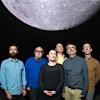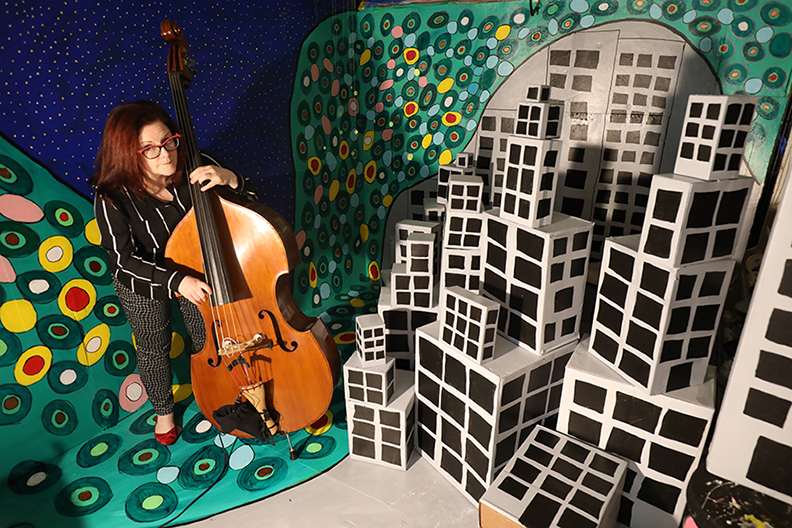
Though the wide open road has inspired many an artist, the monotonous run from the Central Valley to Los Angeles on I-5 surely ranks among the lesser muses. Fortunately, it doesn’t take much to spark Lisa Mezzacappa’s imagination.
While driving from Berkeley to Westwood in August of 2024, the bassist, composer, and bandleader decided the best way to celebrate her 50th birthday and 25th year living in the Bay Area was to launch an ambitious recording project documenting an expansive swath of the Bay Area’s improvised music scene.
“It’s easy to look at milestones in a critical way, so I was thinking about how to feel positive about them,” said Mezzacappa, who was born and raised in New York City. “Looking around at my scene, it’s the reason I’ve been in California for 25 years, and many days it’s a great reason to get out of bed in the morning at 50. I’m surrounded by fabulous artists, creative thinkers and generous collaborators.”
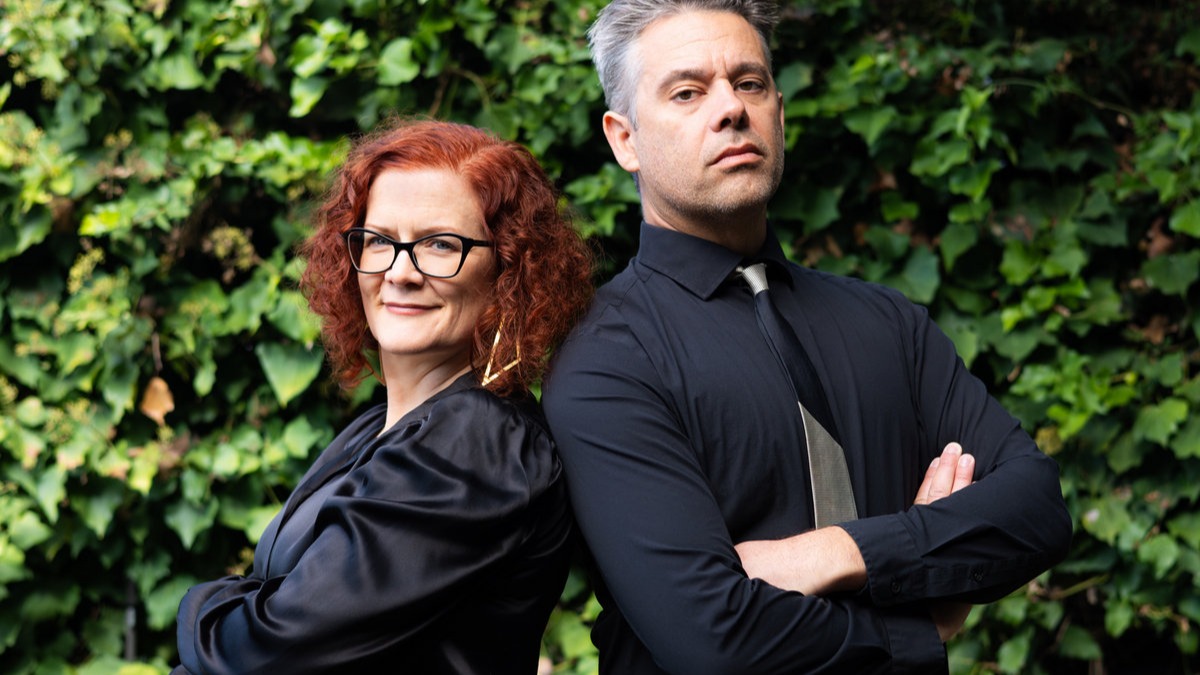
Seeking to elevate those artists, thinkers and collaborators, Mezzacappa launched the 12/12 initiative, a blueprint for releasing a dozen albums over the course of a year on her label, Queen Bee Records. The project began last February with “Luminous Axis,” a recording by her duo B. drums-and-bass ensemble with Jason Levis interpreting Wadada Leo Smith’s graphically-notated scores.
With nine of the twelve recordings complete, 12/12 has turned into a singular portrait of 21st century Bay Area music making. With coverage in jazz publications Downbeat and JazzTimes, the project has attracted national attention to a scene that often struggles for recognition even here at home. Last July, Mezzacappa’s four-night residency at The Stone, the John Zorn-founded performance space that’s ground zero for experimental music, brought many of the 12/12 ensembles to New York City for the first time.
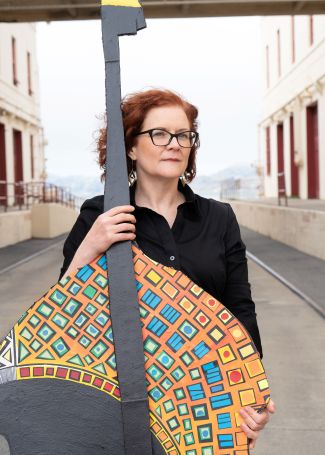
The releases are all by Bay Area bandleaders and feature composed works, free improvisation, and even a musical. Part of what’s so fascinating about the array of ensembles and projects is that there’s a good deal of overlapping personnel — Mezzacappa performs on all the releases, for starters — even though the music represents a broad spectrum of approaches, strategies and aesthetics. Similarly impressive is the attention to detail, down to the striking label design concepts by Dan Nelson that make the disparate albums feel like part of a unified collection.
In celebration of three new 12/12 recordings (numbers seven through nine), Mezzacappa will mark the initiative’s next phase with a two-day Queen Bee Records Micro-Fest #3 at the Dresher Ensemble Studio in West Oakland from Nov. 5-6. Co-presented with the West Oakland Sound Series, Wednesday’s program features the oakland reductionist orchestra and two special guest sets — the first by computer musician Kristin Miltner, and the second with Roco Córdova on voice and electronics and Theresa Wong on cello and vocals.
Directed by composer, clarinetist, and computer music programmer Matt Ingalls, the oakland reductionist orchestra’s debut album produced by Queen Bee Records, west and east baying, features a live performance from The Lab in San Francisco (West Bay) and a studio-constructed work recorded in Berkeley (East Bay). The album captures the 18-piece ensemble that’s coalesced at a weekly series Ingalls has run since the pandemic. Ingalls and many of his fellow reductionists came out of Mills College’s sadly shuttered graduate composition program and their music reflects its emphasis on new technologies and electronic and improvised music.
“Matt’s another tireless worker, putting on high quality concerts and curating interesting repertoire,” Mezzacappa said. “In the reductionist orchestra, everyone makes such a particular, controlled sound, with so much restraint and space. It sounds like it could be an electronic track. In this kind of textural improv, you’re hearing these refined combined sounds, not alto flute, cello and koto individually. By releasing this project, I wanted to honor what Matt has built here. In his Oakland concert series, he’s doing this fantastic work for the community every single week.”
The Nov. 6 Micro-Fest program celebrates the official release of the eighth and ninth 12/12 albums — the Beth Schenck Quintet’s remarkably poised Dahlia and the Nathan Clevenger Group’s ambitious Astrolabe.
One of the Bay Area’s overlooked treasures for the past decade, Schenck is an alto saxophonist with a sleek, translucent tone. Her music somehow encompasses polar alto sax influences, drawing on the gutbucket wail and unpredictable rhythmic forms of Ornette Coleman and the cool, rhapsodic lines of Lee Konitz.
Part of what sets Dahlia apart is that it captures an under-documented artist whose music transcends stylistic conventions. For the album, Mezzacappa urged Schenck to lean into multiple directions.
“I have a few different compositional voices and that can feel quite different,” Schenck said. “I love free group improv playing. I love things with beautiful chords and sounds. As I wrote these pieces, I wasn’t sure they would work together on an album. Lisa convinced me they would. Yes, they’re all different, but your DNA is in all of them.”
Mezzacappa played a similar role in shepherding Clevenger’s Astrolabe to fruition. Given the size of the ensemble and complexity of his pieces, Clevenger wasn’t particularly inclined to record the new music as he thought it would entail “a tremendous series of hassles.”
“It’s very lonely to release an album, especially if you’re an indie artist. The streaming world has taken the idea of releasing an album and diminished it. It’s hard to get a feeling of momentum about putting your music out.”
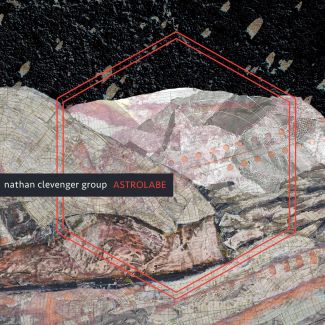 He describes 12/12 as “very Lisa — ridiculous in the best possible way,” and credits her with convincing him to put Astrolabe on the roster. The release schedule provided structure and momentum, and the projects furthered creative conversations already taking place in the Bay Area.
He describes 12/12 as “very Lisa — ridiculous in the best possible way,” and credits her with convincing him to put Astrolabe on the roster. The release schedule provided structure and momentum, and the projects furthered creative conversations already taking place in the Bay Area.
The album is a sharp turn from Clevenger’s previous work — he is a guitarist known for leading ensembles built on a traditional rhythm-section-and-winds format.
During the first years of the pandemic, Clevenger started composing from the piano, and he brought mallets and percussion to the foreground of his instrumental palette. Partly inspired by minimalist composers, Clevenger ultimately created his own oddly shaped musical forms laced with improvisational passages for well-equipped explorers like saxophonists Schenck, Wright, and Kasey Knudsen. With Crystal Pascucci-Clifford’s cello and shimmering waves of interlocking percussion by Levis (marimba and percussion), drummer Jon Arkin and Tim DeCillis and Mark Pascucci-Clifford (vibes and percussion), the music on Astrolabe often feels expansively cinematic.
In turning her attention to 12/12, Mezzacappa has offered an object lesson in the power of community in the face of atomization.
“I think it’s a great snapshot of the scene, which is tightly connected but really disparate,” Clevenger said. “There are bands with similar personnel and wildly different music, and artists who can get on board with so many different compositional intentions. There are people in the series who aren’t convinced in the efficacy of putting out albums. But this felt less like throwing wares into the volcano of the market place. These records got made and exist, and Lisa gave people a context for believing this is worth doing.”




